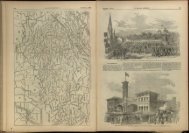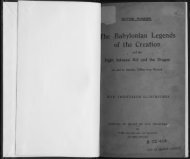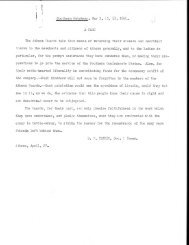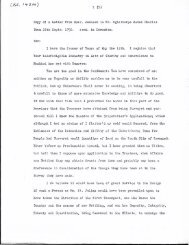THE SHE KING; OR, THE BOOK OF ANCIENT POETRY
THE SHE KING; OR, THE BOOK OF ANCIENT POETRY
THE SHE KING; OR, THE BOOK OF ANCIENT POETRY
You also want an ePaper? Increase the reach of your titles
YUMPU automatically turns print PDFs into web optimized ePapers that Google loves.
<strong>THE</strong> <strong>BOOK</strong> <strong>OF</strong> POETEY.<br />
PAET IV.<br />
ODES <strong>OF</strong> <strong>THE</strong> TEMPLE AND <strong>THE</strong> ALTAE.<br />
<strong>BOOK</strong> I. Sacrificial Odes of Chow.<br />
SECTION I. DECADE <strong>OF</strong> TS'ING MEAOU.<br />
TITLE or <strong>THE</strong> PART. This is simply in Chinese Sung;—meaning,<br />
according to the Preface, "pieces in admiration of the embodied mani<br />
festation of complete virtue, announcing to Spiritual Beings their achieve<br />
ment thereof." Two other definitions are—" Songs for the music of the<br />
ancestral temple," and " Songs for the music at sacrifices." I have com-<br />
bined these two accounts of the pieces, though there are a few whose<br />
only claim to have anything to do with sacrifices is that they are found<br />
here. Of the pieces in the Second Book I will speak when we come to them.<br />
—It has been mentioned in the prolegomena that some of the pieces do<br />
not rhyme. This is probably the reason why they have not in this Book<br />
been divided into stanzas and numbered.<br />
TITLE <strong>OF</strong> <strong>THE</strong> <strong>BOOK</strong>. The pieces in this were all appropriate to the<br />
temple services of the kings of Chow ; and they are arranged in sections,<br />
two of which contain ten pieces each, and the third, like the third Book<br />
of last Part, eleven. Yet all the sections are called Decades. Choo con<br />
tends, in opposition to the older interpreters, and correctly in my opinion,<br />
that of the thirty-one pieces in the Sung of Chow, while most were made<br />
(or fixed) by the duke of Chow, there are some among them belonging to<br />
the reign of king K'ang (B.C. 1077—1050), and even of a later date.<br />
I.<br />
The Ts'ing meartu; narrative. CELEBRATING <strong>THE</strong> REVERENTIAL<br />
MANNER IN WHICH A SACRIFICE TO <strong>KING</strong> WAN WAS PERF<strong>OR</strong>MED, ASD<br />
FUR<strong>THE</strong>R PRAISING HIM.<br />
Choo agrees with the Preface in assigning the composition of this piece<br />
to the time of the sacrifice mentioned in the Book of History, V. xiii. 29,<br />
when, the building of Loh being completed, king Ching came to the new<br />
city, and offered a red bull to Wan and the same to Woo.<br />
BE I. ii.] <strong>THE</strong> <strong>BOOK</strong> <strong>OF</strong> POETEY. 351<br />
Solemn and pure the ancestral temple stands.<br />
The princes aiding in the service move<br />
With reverent harmony. The numerous bands<br />
Of officers their rapt devotion prove.<br />
All these the virtues of king Wan pursue;<br />
And while they think of him on high in heaven,<br />
With grace and dignity they haste to do<br />
The duties to them in his temple given.<br />
Glory and honour follow Wan's great name,<br />
And ne'er will men be weary of his fame.<br />
II.<br />
The Wei Teen eke ming; narrative. CELEBRATING <strong>THE</strong> VIRTUE or<br />
<strong>KING</strong> WAN AS COMPARABLE TO THAT <strong>OF</strong> HEAVEN ; AND LOO<strong>KING</strong> TO<br />
HIM F<strong>OR</strong> BLESSING IN <strong>THE</strong> FUTURE.<br />
The Preface says that in this piece there is an announcement of the<br />
realization of complete peace throughout the kingdom ; and the old in<br />
terpreters referred it to a sacrifice to Wan by the duke of Chow, when he<br />
had completed his Statutes for the new dynasty in the sixth year of hia<br />
regency after the death of Woo. But neither the piece nor any ancient<br />
testimony authorizes a more definite argument of the contents than that<br />
which I have given.<br />
Heaven by a deep and ceaseless law<br />
Orders its ways with man.<br />
Pure shone, without a single flaw, .<br />
The virtue of king Wan.<br />
To us he shows his kindness still.<br />
As all our powers we strain<br />
To be in concord with his will,<br />
His favour we shall gain.<br />
So may the last his throne to fill<br />
His love and grace retain !<br />
Latirie. By W. T. Mercer.<br />
Jussa profunda taanent magni mandataque Cosli,<br />
Et Regis probitas undique mira fuit.<br />
Qua ratione petit Rex nunc monstrare favorem?<br />
Sit satis; et nobis munera grata fluant:<br />
Nos inter Tiegemque bonum concordia regnet,<br />
Et mentem similem saacla futura colant.<br />
1








